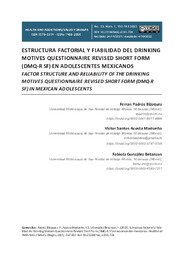Por favor, use este identificador para citar o enlazar este ítem:
https://hdl.handle.net/11000/29148Registro completo de metadatos
| Campo DC | Valor | Lengua/Idioma |
|---|---|---|
| dc.contributor.author | Padrós-Gómez, Carles | - |
| dc.contributor.author | Acosta Madueño, Victor Santos | - |
| dc.contributor.author | Gonzalez-Betanzos, Fabiola | - |
| dc.contributor.other | Departamentos de la UMH::Psicología de la Salud | es_ES |
| dc.date.accessioned | 2023-04-18T11:57:06Z | - |
| dc.date.available | 2023-04-18T11:57:06Z | - |
| dc.date.created | 2023-01 | - |
| dc.identifier.citation | Health and Addictions/Salud y Drogas Vol. 23 Núm. 1 (2023) | es_ES |
| dc.identifier.issn | 1988-205X | - |
| dc.identifier.issn | 1578-5319 | - |
| dc.identifier.uri | https://hdl.handle.net/11000/29148 | - |
| dc.description.abstract | Uno de los instrumentos más utilizados y estudiados a nivel mundial para evaluar los motivos para consumir alcohol es el cuestionario de motivos para beber, Drinking Motives Questionnaire (DMQ) basado en el modelo de Cox & Klinger (1988), del cual se han realizado diferentes versiones y se han hallado distintas estructuras factoriales del mismo. Sin embargo, en México no se han estudiado las propiedades psicométricas del DMQ en ninguna de sus versiones. Objetivo. Debido a la necesidad de disponer de un instrumento para evaluar los motivos de consumo de alcohol, este estudio propone adaptar el instrumento en población adolescente mexicana. Método. Se administró la versión más larga del cuestionario (28 ítems) a 464 adolescentes de entre 13 y 18 años (M = 16.20; DE = 1.24), en esta muestra n=179 eran del sexo femenino (55.1%). Resultados. Se compraran el ajuste de cinco versiones distintas del instrumento, el único modelo que obtuvo un ajuste adecuado fue el de la versión breve de 12 reactivos, además mostró adecuados índices de consistencia interna(α = .88 y ω= .94). Conclusión. La versión corta del DMQ-R-12 es un instrumento que ha mostrados validez de constructo y fiabilidad adecuadas para evaluar los motivos de consumo de alcohol en adolescentes mexicanos | es_ES |
| dc.description.abstract | One of the most widely used and studied instruments worldwide to assess the reasons for consuming alcohol is the Drinking Motives Questionnaire (DMQ) based on the Cox & Klinger (1988) model, of which different versions have been made and have shown different factorial structures. However, in Mexico the psychometric properties of the DMQ and its versions have not been studied. Objetive. Due to the need for an instrument to assess the reasons for alcohol consumption, this study set out to adapt and study some psychometric properties of the DMQ-R and its di - fferent versions in the Mexican adolescent population. Method. The longest version of the questionnaire (28 items) was administered to 464 adolescents between 13 and 18 years old (M = 16.20; SD = 1.24), in this sample n=179 were female (55.1%). Results. Five different versions of the test were fitted. The only model that obtained an adequate fit was that of the short version of 12 questions, which also showed adequate internal consistency indexes(α = .88 y ω = .94). Conclusion. The short version of the DMQ-R-12 is an instrument that has shown adequate construct validity and reliability to evaluate the reasons for alcohol consumption in Mexican adolescents | es_ES |
| dc.format | application/pdf | es_ES |
| dc.format.extent | 12 | es_ES |
| dc.language.iso | spa | es_ES |
| dc.publisher | Universidad Miguel Hernández de Elche | es_ES |
| dc.rights | info:eu-repo/semantics/openAccess | es_ES |
| dc.rights.uri | http://creativecommons.org/licenses/by-nc-nd/4.0/ | * |
| dc.subject | Alcohol | es_ES |
| dc.subject | motivación | es_ES |
| dc.subject | adolescentes | es_ES |
| dc.subject | DMQ | es_ES |
| dc.subject | fiabilidad | es_ES |
| dc.subject | Alcohol | es_ES |
| dc.subject | motivation | es_ES |
| dc.subject | teenagers | es_ES |
| dc.subject | reliability | es_ES |
| dc.subject.other | 159.9 - Psicología | es_ES |
| dc.title | Estructura factorial y fiabilidad del Drinking Motives Questionnaire Revised Short Form (DMQ-R SF) en adolescentes mexicanos | es_ES |
| dc.title.alternative | Factor structure and reliability of the drinkingmotives questionnaire revised short form (dmq-r sf) in mexican adolescents | es_ES |
| dc.type | info:eu-repo/semantics/article | es_ES |
| dc.relation.publisherversion | https://doi.org/10.21134/haaj.v23i1.724 | es_ES |

Ver/Abrir:
724-Texto del artículo-4770-1-10-20230127.pdf
722,58 kB
Adobe PDF
Compartir:
 La licencia se describe como: Atribución-NonComercial-NoDerivada 4.0 Internacional.
La licencia se describe como: Atribución-NonComercial-NoDerivada 4.0 Internacional.
.png)